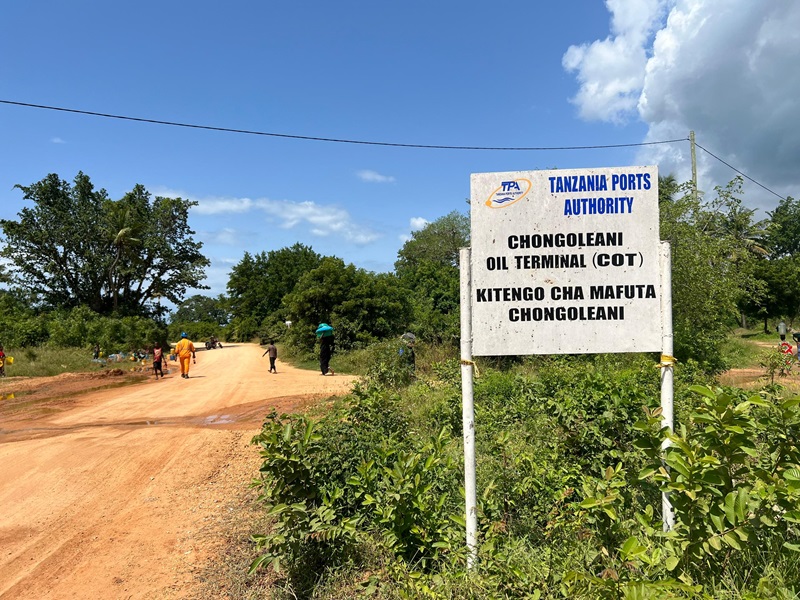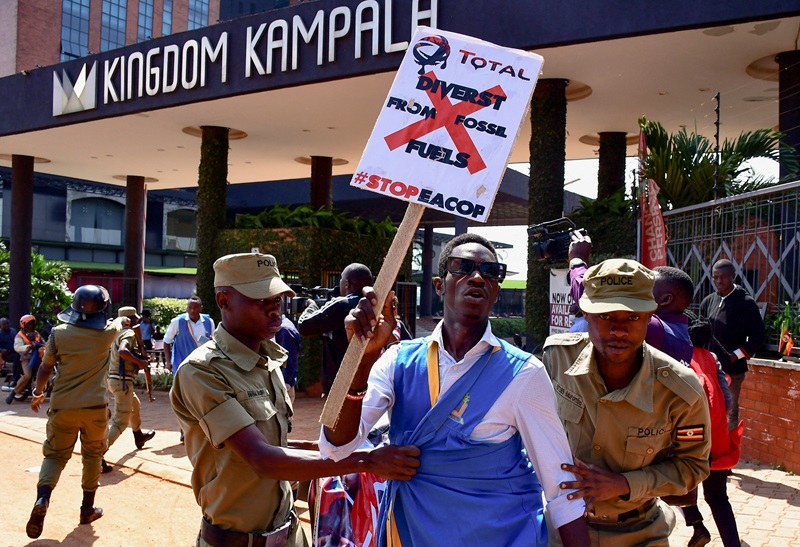The oil export venture has pushed up the worth of land, so compensation is simply too low to take care of affected villagers’ lifestyle
The serene shoreline of Chongoleani was once a little-known paradise for native fishers and farmers simply north of the Tanzanian metropolis of Tanga.
However now it’s turning into the end-point for the East African Crude Oil Pipeline (EACOP) the place, after a journey of over 1,400 km via Uganda and Tanzania, the oil is saved and put onto ships certain for purchasers overseas.
EACOP is a three way partnership between French multinational TotalEnergies, the China Nationwide Offshore Oil Company and the governments of Uganda and Tanzania. It plans to deliver oil from the Tilenga and Kingfisher oil fields close to Uganda’s Lake Albert, down previous Lake Victoria and all the best way east via Tanzania to the Chongoleani Peninsula.
Whereas the $4-billion venture guarantees financial development and power safety for the area, it has sparked protests as a result of its detrimental environmental, financial and social impacts – which have been met by crackdowns on the a part of the authorities in each international locations.
East African local weather activists have joined forces with their worldwide counterparts in a marketing campaign referred to as #StopEACOP, arguing that the pipeline will exacerbate local weather change by transporting 246,000 barrels of oil a day to prospects to burn, releasing greenhouse gases. In addition they warn that it’s going to displace 1000’s of individuals and endangers water sources, wetlands, nature reserves and wildlife.
The Ugandan authorities says that it has the suitable to take advantage of the nation’s fossil gas sources to be able to fund much-needed financial improvement and is taking measures to scale back the venture’s local weather impression, equivalent to heating the pipeline with photo voltaic power. Rich nations just like the US, Canada and Australia, in the meantime, are additionally rising fossil gas manufacturing.
Dwelling “like city dwellers”
In Tanzania, Chongoleani residents mentioned they’d been warned by the village chairman and different ward leaders to not speak to journalists, however Local weather Dwelling spoke to 2 whose land had been taken over by the federal government for the pipeline and its port.
With out enough compensation, they mentioned they’d been unable to purchase a brand new farm within the space and have to purchase meals from the town fairly than rising their very own and promoting the excess.
Mustafa Mohammed Mustafa mentioned his household used to personal two farms in Kigomeni village, collectively about as large as eight soccer pitches. On these, they grew coconut, cassava, corn and groundnuts. They ate a few of it and offered the remainder.
However with the pipeline coming, the government-owned Tanzania Ports Authority took over their land, compensating them with 15m Tanzanian shillings ($5,700), which hasn’t been sufficient for them to purchase new farmland within the space.
“We stay like city dwellers lately,” mentioned Mustafa. “We purchase firewood, we purchase charcoal, we purchase lemons, coconut, cassava. We purchase all of those provides from the town centre. How is that this alright?”
Home costs soar
A part of the rationale they can’t afford a farm, says Mustafa, is that EACOP’s arrival has elevated the worth of native land, as it’s thought-about a venture space with potential for enterprise funding.
Villagers both put a excessive worth on their land or maintain onto it and solely settle for provides from the federal government or overseas traders, in keeping with Mustafa, believing this may get them a greater deal.

An indication for Chongoleani oil terminal (Photograph: Local weather Dwelling Information)
Mustafa blames the federal government for not giving them correct info from the preliminary phases of the venture, nor a selection about whether or not they needed to promote their property. As an alternative, he mentioned, they had been advised that the venture is of nice financial significance for the nation.
“I’m indignant that the federal government took benefit of our ignorance of authorized issues and gave us a nasty deal that we couldn’t argue in opposition to,” Mustafa mentioned.
Sitting alongside Mustafa in Chongoleani village, Mdiri Akida Sharifu mentioned he regrets promoting his household’s land in Kigomeni however they’d no different choice.
“In the intervening time, we now have little or no religion that this may profit us. When authorities officers got here right here, they inspired us to surrender our land with the promise that when the venture began, we might be given precedence in getting jobs. However now that we’ve given up our land, we even have to purchase lemons from Tanga city,” he mentioned.
Countrywide compensation battles
Elsewhere alongside the pipeline’s routes, landowners have complained about unfair compensation, saying the federal government paid them in 2023 utilizing worth estimates made in 2016, ignoring seven years of inflation. Kamili Fabian from the Manyara area advised native paper Mwananchi that he was paid lower than a 3rd of his land’s worth. “The place is the justice in that?” he requested.
The federal government says it makes use of nationwide and worldwide requirements to compensate individuals pretty. Vitality minister Doto Biteko has mentioned 35bn shillings ($13m) had been allotted for this function and the federal government had constructed 340 new properties for relocated individuals.
Reporting on these points is a problem. When Local weather Dwelling visited the coastal village of Putini, a person referred to as Mahimbo – who would solely give one identify – refused to touch upon the compensation course of and mentioned native leaders had advised the villagers to not converse to journalists in regards to the pipeline.
However he took Local weather Dwelling to the workplace of village chairperson Abdallah Stated Kanuni to hunt permission to touch upon the file. “We now have been given clear directions to neither converse with journalists nor permit them to interview villagers on issues referring to the pipeline, until the journalists have official permits from the regional [government] workplace,” Kanuni mentioned.
Enroll to get our weekly publication straight to your inbox, plus breaking information, investigations and additional bulletins from key occasions
Compensation battles are enjoying out far past this space. A Complete spokesperson advised Local weather Dwelling practically 19,000 households have been compensated for the consequences of the pipeline and the related Tilenga oil discipline on them and about 750 alternative homes have been handed over.
However Diana Nabiruma, communications officer for the Africa Institute for Vitality Governance (AFIEGO), mentioned her organisation had spoken to tons of of people that had obtained compensation and had but to fulfill any that mentioned it was enough.
She mentioned a significant downside has been that individuals had been paid in 2023 primarily based on their land’s worth in 2019. As in Chongoleani, the worth of land rose in these 4 years, partly due to EACOP and the promise of paved roads. Many individuals haven’t been in a position to change the property they misplaced, she mentioned.

Ugandan riot cops detain an anti-EACOP activist in Kampala, Uganda, on October 4, 2022. (REUTERS/Abubaker Lubowa)
Nabiruma added that many individuals need to search top-up compensation however are scared – and unable to afford – to problem EACOP and the federal government in court docket. In Uganda’s capital Kampala, police have overwhelmed and arrested activists protesting in opposition to the pipeline.
The Complete spokesperson mentioned EACOP will enhance dwelling situations, including that Complete complies with native rules and worldwide requirements and there’s a honest grievance administration mechanism in place for native individuals.
An EACOP spokesperson mentioned that since final 12 months, the venture has supplied households affected by leasing of their land in Chongoleani with meals baskets and money transfers, including that the villagers are given preferential entry to unskilled or semi-skilled work on the venture.
The Tanzania Ports Authority didn’t reply to a request for remark.
(Reporting by CHN employees and Joe Lo, enhancing by Joe Lo and Megan Rowling)
